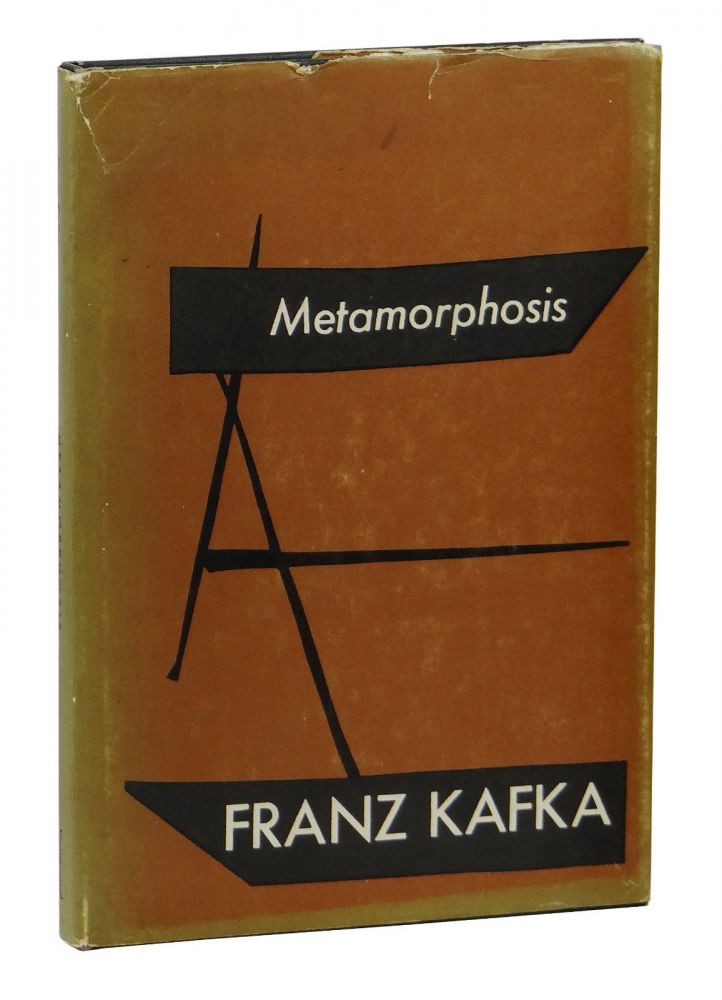Time for some Franz Kafka!
After listening to me gripe about some recent journey through bureaucratic hell, a friend recently made reference to Franz Kafka's The Castle, a scene where a clerk slowly and carefully moves files one at a time in a perfect depiction of the methodical mindlessness of the socio-biomachine that is the modern bureaucratic state. It reminded me of every interaction I have ever had with the phone company, the bank, the government, the insurance company. A perfect book for our times, and... a Kafka title I have not yet read. As I rooted around through my shelves, I found a couple of different copies of The Castle. A relatively new translation by Mark Harman looks like the one to crack.
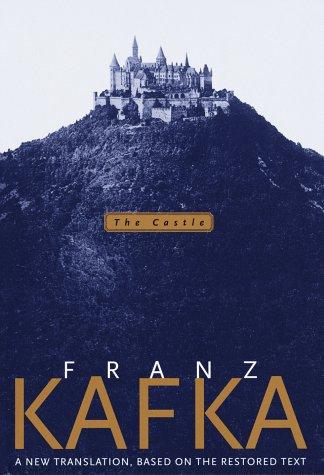 The Castle. New York. 1998. Schocken Books. New Translation Based On The Restored Text. 0805241183. Translated from the German by Mark Harman. 328 pages. hardcover. Jacket Photograph: Culver Pictures Jacket Design By Kathleen Digrado.
The Castle. New York. 1998. Schocken Books. New Translation Based On The Restored Text. 0805241183. Translated from the German by Mark Harman. 328 pages. hardcover. Jacket Photograph: Culver Pictures Jacket Design By Kathleen Digrado.
FROM THE PUBLISHER - Franz Kafka's final novel tells the haunting tale of a man known only as K. and of his relentless, unavailing struggle with an inscrutable authority in order to gain entrance to the Castle. Although Kafka seemed to consider THE CASTLE a failure, critics, in wrestling with its enigmatic meaning, have recognized it as one of the great novels of our century. Unfinished at Kafka's death in 1924, the manuscript of THE CASTLE was edited for publication by Kafka's friend and literary executor, Max Brod. Both Brod's edition and the English-language translation of it that was prepared by Willa and Edwin Muir in 1930 have long been considered flawed. This new edition of Kafka's terrifying and comic masterpiece is the product of an international team of experts who went back to Kafka's original manuscript and notes to create a text that is as dose as possible to the way the author left it. The Times Literary Supplement hailed their work, saying that it will ‘decisively alter our understanding of Kafka and render previous editions obsolete.’ Mark Harman's brilliant translation closely follows the fluidity and breathlessness of the sparsely punctuated original manuscript, revealing levels of comedy, energy, and visual power that have not been previously accessible to English-language readers. W. H. Auden likened Kafka to Dante, Shakespeare, and Goethe as the single most important writer of his age. Here, in this new edition, is a Kafka for the twenty-first century.
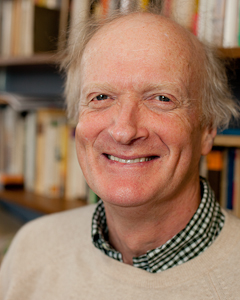 Translator MARK HARMAN holds a Ph.D. from Yale University and has taught German and Irish literature at Oberlin and Dartmouth. In addition to writing scholarly essays on Kafka and other modern authors, he has edited and co-translated ROBERT WALSER REDISCOVERED: STORIES, FAIRY-TALE PLAYS, and CRITICAL RESPONSES and has translated SOUL OF THE AGE: SELECTED LETTERS OF HERMANN HESSE, 1891-1962. He teaches literature at the University of Pennsylvania.
Translator MARK HARMAN holds a Ph.D. from Yale University and has taught German and Irish literature at Oberlin and Dartmouth. In addition to writing scholarly essays on Kafka and other modern authors, he has edited and co-translated ROBERT WALSER REDISCOVERED: STORIES, FAIRY-TALE PLAYS, and CRITICAL RESPONSES and has translated SOUL OF THE AGE: SELECTED LETTERS OF HERMANN HESSE, 1891-1962. He teaches literature at the University of Pennsylvania.
I also found this biography of Kafka...
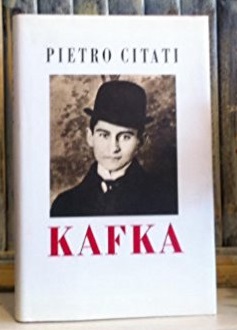 Citati, Pietro. Kafka. New York. 1990. Knopf. 0394568400. Translated from the Italian by Raymond Rosenthal. 320 pages. hardcover.
Citati, Pietro. Kafka. New York. 1990. Knopf. 0394568400. Translated from the Italian by Raymond Rosenthal. 320 pages. hardcover.
FROM THE PUBLISHER - Kafka is a major biographical study of one of the most brilliant yet personally elusive writers of the 20th century, by an internationally admired scholar and writer. Translated from the Italian by Raymond Rosenthal. A superb account of the inner creative spirit of Kafka, this book contains brilliantly executed readings of all the major works.
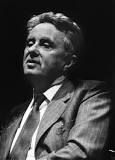 Pietro Citati (born February 20, 1930, Florence, Italy) is a famous Italian writer and literary critic. He has written critical biographies of Goethe, Alexander the Great, Kafka and Marcel Proust as well as a short memoir on his thirty-year friendship with Italo Calvino.
Pietro Citati (born February 20, 1930, Florence, Italy) is a famous Italian writer and literary critic. He has written critical biographies of Goethe, Alexander the Great, Kafka and Marcel Proust as well as a short memoir on his thirty-year friendship with Italo Calvino.
I would like to believe that any friend of Calvino's could probably be a friend of mine, in some imaginary universe of course, where I actually hop-nobbed with folks like that. Within a few pages I discovered a number of things about Kafka about which I was previously unaware. Who knew that Kafka was " a tall man, thin and lithe, who carried his long body as though it had been given to him as a gift." Or that he actually seemed to like his job at the Institute for Workers Accident Insurance Company for the Kingdom of Bohemia in Prague (I find that one a little hard to believe, but I'll let the biographer make his case).
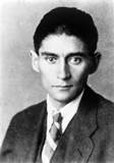 Franz Kafka (July 3, 1883 - June 3, 1924) was a German-language Czech writer (born in Prague) of novels and short stories. Kafka was born into a middle-class, German-speaking Jewish family in Prague, then part of the Austro-Hungarian Empire, and trained as a lawyer. After earning a law degree in 1906, he worked most of his adult life at the Workers Accident Insurance Company for the Kingdom of Bohemia in Prague. In his spare time, he wrote short stories, as well as hundreds of letters to close female friends and family, including his father, his fiancée Felice Bauer, and his youngest sister Ottla. He had a complicated and troubled relationship with his father that had a major impact on his writing, and he was conflicted over his Jewishness and felt it had little to do with him. Only a small portion of his writings were published during his lifetime; most of them, including the three unfinished novels, AMERIKA, THE TRIAL, and THE CASTLE, were published posthumously. He is regarded by critics as one of the most influential authors of the 20th century. Kafka strongly influenced genres such as existentialism. His works, such as ‘Die Verwandlung‘ (‘The Metamorphosis’), Der Process (The Trial), and Das Schloss (The Castle), are filled with the themes and archetypes of alienation, physical and psychological brutality, parent–child conflict, characters on a terrifying quest, and mystical transformations. Kafka died of tuberculosis in a sanitorium near Vienna in 1924.
Franz Kafka (July 3, 1883 - June 3, 1924) was a German-language Czech writer (born in Prague) of novels and short stories. Kafka was born into a middle-class, German-speaking Jewish family in Prague, then part of the Austro-Hungarian Empire, and trained as a lawyer. After earning a law degree in 1906, he worked most of his adult life at the Workers Accident Insurance Company for the Kingdom of Bohemia in Prague. In his spare time, he wrote short stories, as well as hundreds of letters to close female friends and family, including his father, his fiancée Felice Bauer, and his youngest sister Ottla. He had a complicated and troubled relationship with his father that had a major impact on his writing, and he was conflicted over his Jewishness and felt it had little to do with him. Only a small portion of his writings were published during his lifetime; most of them, including the three unfinished novels, AMERIKA, THE TRIAL, and THE CASTLE, were published posthumously. He is regarded by critics as one of the most influential authors of the 20th century. Kafka strongly influenced genres such as existentialism. His works, such as ‘Die Verwandlung‘ (‘The Metamorphosis’), Der Process (The Trial), and Das Schloss (The Castle), are filled with the themes and archetypes of alienation, physical and psychological brutality, parent–child conflict, characters on a terrifying quest, and mystical transformations. Kafka died of tuberculosis in a sanitorium near Vienna in 1924.
If you have a hankering for some Kafka, here are some possibilities . . .
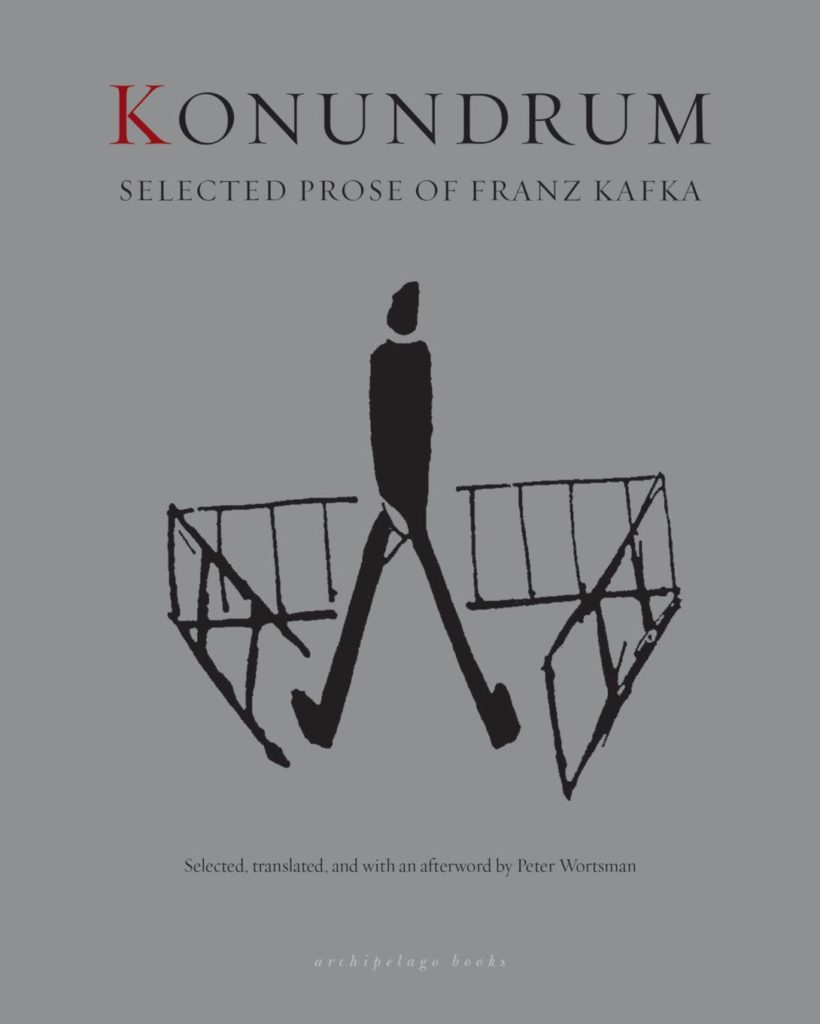 Konundrum: Selected Prose of Franz Kafka. Brooklyn. 2016. Archipelago Books. 9780914671510. Selected and translated from the German by Peter Worstman. 238 pages. paperback. Cover art: Franz Kafka. Cover design: Megan Mangum.
Konundrum: Selected Prose of Franz Kafka. Brooklyn. 2016. Archipelago Books. 9780914671510. Selected and translated from the German by Peter Worstman. 238 pages. paperback. Cover art: Franz Kafka. Cover design: Megan Mangum.
FROM THE PUBLISHER - In this new selection and translation, Peter Wortsman mines Franz Kafka's entire opus of short prose--including works published in the author s brief lifetime, posthumously published stories, journals, and letters--for narratives that sound the imaginative depths of the great German-Jewish scribe from Prague. It is the first volume in English to consider his deeply strange, resonantly humane letters and journal entries alongside his classic short fiction and lyrical vignettes Transformed is a vivid retranslation of one of Kafka's signature stories, Die Verwandlung, commonly rendered in English as The Metamorphosis. Composed of short, black comic parables, fables, fairy tales, and reflections, Konundrums also includes classic stories like In the Penal Colony, Kafka's prescient foreshadowing of the nightmare of the Twentieth Century, refreshing the writer's mythic storytelling powers for a new generation of readers. CONTENTS: Words are Miserable Miners of Meaning; Letter to Ernst Rowohlt; Reflections; Concerning Parables; Children on the Country Road; The Spinning Top; The Street-Side Window; At Night; Unhappiness; Clothes Make the Man; On the Inability to Write; From Somewhere in the Middle; I Can Also Laugh; The Need to Be Alone; So I Sat at My Stately Desk; A Writer's Quandary; Give it Up!; Eleven Sons; Paris Outing; The Bridge; The Trees; The Truth About Sancho Pansa; The Silence of the Sirens; Prometheus; Poseidon; The Municipal Coat of Arms; A Message from the Emperor; The Next Village Over; First Sorrow; The Hunger Artist; Josephine, Our Meistersinger, or the Music of Mice; Investigations of a Dog; A Report to an Academy; A Hybrid; Transformed; In the Penal Colony; From The Burrow; Selected Aphorisms; Selected Last Conversation Shreds; In the Caves of the Unconscious: K is for Kafka (An Afterword); The Back of Words (A Post Script).
The Trial
Written in 1914, THE TRIAL is one of the most important novels of the twentieth century: the terrifying tale of Josef K., a respectable bank officer who is suddenly and inexplicably arrested and must defend himself against a charge which is never specified. Whether read as an existential tale, a parable, or a prophecy of the excesses of modern bureaucracy wedded to the madness of totalitarianism, Kafka’s nightmare has resonated with chilling truth for generations of readers. The story is a Pilgrim’s Progress of the subconscious, the phantasmagoria of a sensitive mind oppressed and bewildered by the burden of living.
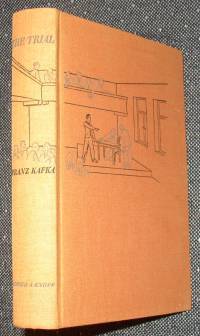 The Trial. New York. 1937. Knopf. 1st American Edition. Illustrated by Georg Salter. Translated from the German by Willa and Edwin Muir. 297 pages. hardcover.
The Trial. New York. 1937. Knopf. 1st American Edition. Illustrated by Georg Salter. Translated from the German by Willa and Edwin Muir. 297 pages. hardcover.
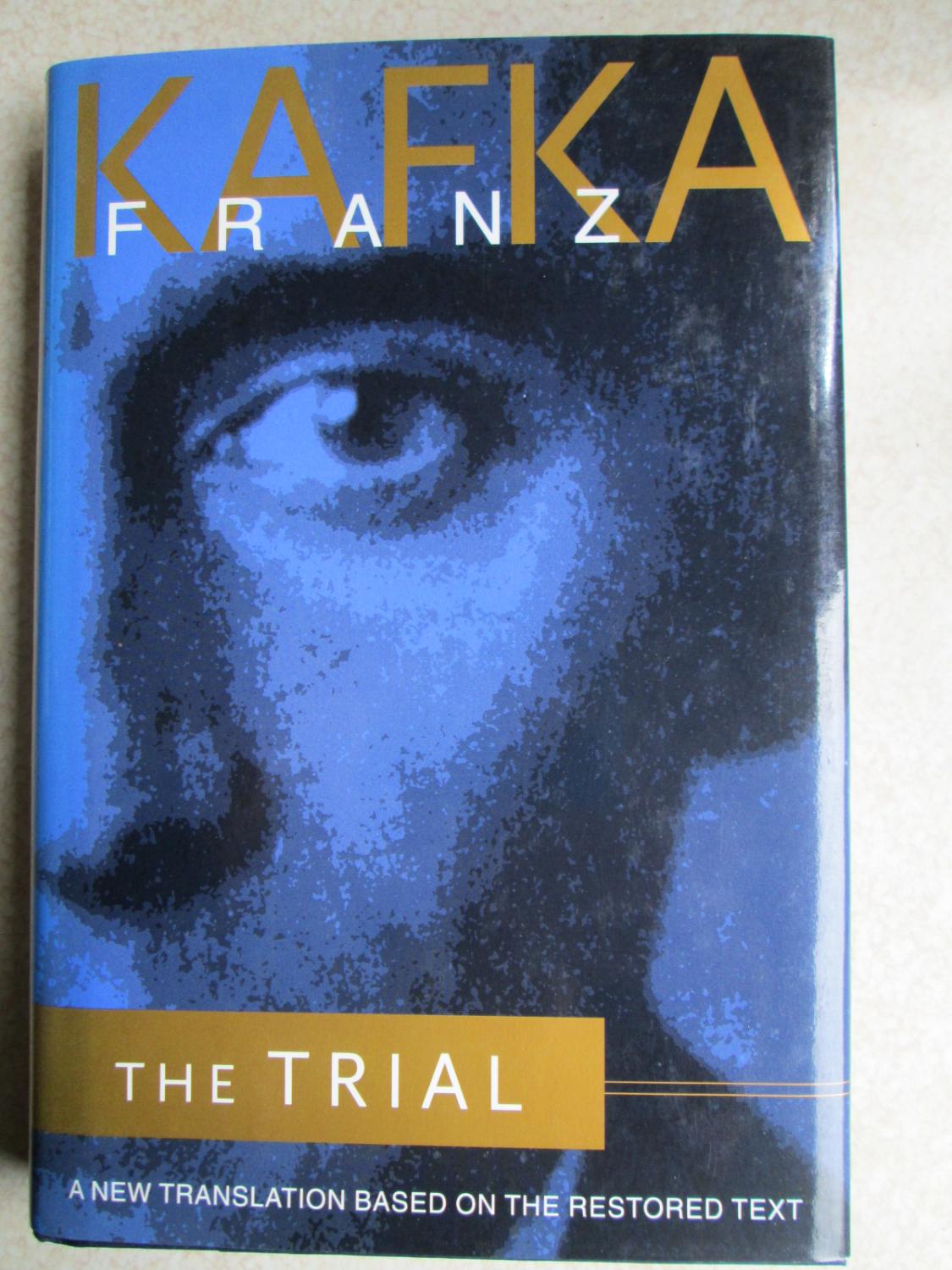 The Trial. New York. 1998. Schocken Books. 1st Edition of This New Translation Based On The Restored Text. 0805241655. Translated from the German by Breon Mitchell. 276 pages. hardcover. Jacket design by Kathleen DiGrado.
The Trial. New York. 1998. Schocken Books. 1st Edition of This New Translation Based On The Restored Text. 0805241655. Translated from the German by Breon Mitchell. 276 pages. hardcover. Jacket design by Kathleen DiGrado.
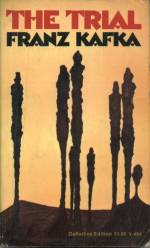 The Trial. New York. 1969. Vintage Books. 0394704843. Revised & With Additional Materials. Translated by E. M. Butler. Illustrated by George Salter. Translated from the German by Willa & Edwin Muir. 343 pages. paperback.
The Trial. New York. 1969. Vintage Books. 0394704843. Revised & With Additional Materials. Translated by E. M. Butler. Illustrated by George Salter. Translated from the German by Willa & Edwin Muir. 343 pages. paperback.
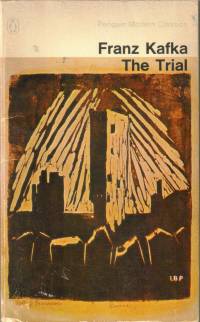 The Trial. Middlesex. 1970. Penguin Books. Penguin Modern Classic Edition. 0140009078. Translated from the German by Willa and Edwin Muir. 256 pages. paperback. The cover shows 'Ruins', by Lotte B. Prechner at the Bibliotheque Nationale, Paris.
The Trial. Middlesex. 1970. Penguin Books. Penguin Modern Classic Edition. 0140009078. Translated from the German by Willa and Edwin Muir. 256 pages. paperback. The cover shows 'Ruins', by Lotte B. Prechner at the Bibliotheque Nationale, Paris.
Metamorphosis
METAMORPHOSIS is one of the most terrifying stories ever written. A man wakes up one morning to find himself transformed into a giant insect. Kafka describes his reactions and the reactions of his family - at first horrified, then kind, wrathful, despising, and finally negligent. This haunting parable on human reaction to suffering and disease has already become a classic.
Metamorphosis. New York. 1946. Vanguard Press. 1st American Edition. Drawings by Leslie Sherman. Translated from the German by A. L. Lloyd. 98 pages. hardcover.
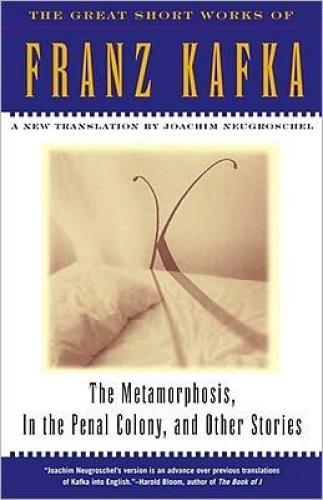 The Metamorphosis & Other Stories. New York. 1993. Scribners. New Translation. 0684800705. Newly Translated from the German by Joachim Neugroschel. 352 pages. paperback.
The Metamorphosis & Other Stories. New York. 1993. Scribners. New Translation. 0684800705. Newly Translated from the German by Joachim Neugroschel. 352 pages. paperback.
Amerika
Kafka began his first novel in 1911, but like the others, Amerika remained unfinished, and perhaps, as Klaus Mann suggested, ‘necessarily endless.’ Karl Rossman, the youthful hero of the novel, ‘a poor boy of seventeen,’ has been banished by his parents to America, following a scandal. There, he throws himself into adventure after misadventure, and experiences multiply as he makes his way into the heart of the country, to The Great Nature Theater of Oklahoma. In creating this new translation, Hofmann, as he explains in his introduction, returned to the manuscript version of the book, restoring matters of substance and detail. Fragments which have never before been presented in English are now reinstated-including the book’s original ending. ‘A century after his birth Kafka seems the last holy writer, and the supreme fabulist of modern man’s cosmic predicament.’ - John Updike, The New Yorker. ‘I believe that Kafka never wrote a more accurate picture of Central Europe than in his novel Amerika.’ - Eleanor Clark, The Griffin. ‘This fantasy of a New World, so full of a childlike genius. . . .this strange book - Amerika. But more lovers of the extraordinary will be found for it in time.’ - Thomas Mann.
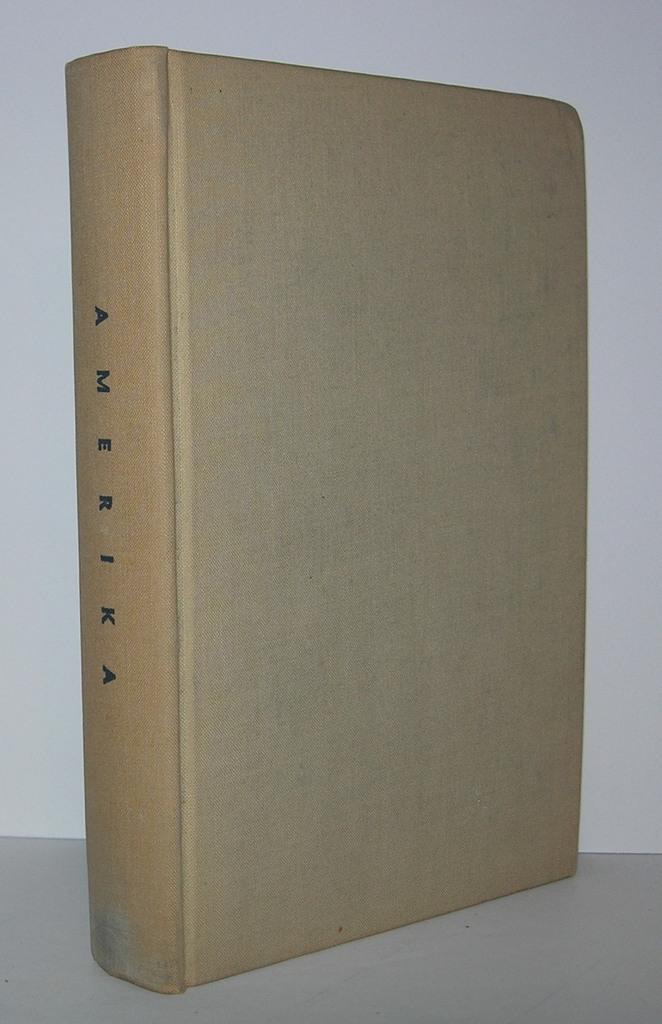 Amerika. Norfolk. 1940. New Directions. 1st American Edition. Illustrations by Emlen Etting. Preface by Klaus Mann. Translated from the German by Edwin Muir. 277 pages. hardcover.
Amerika. Norfolk. 1940. New Directions. 1st American Edition. Illustrations by Emlen Etting. Preface by Klaus Mann. Translated from the German by Edwin Muir. 277 pages. hardcover.
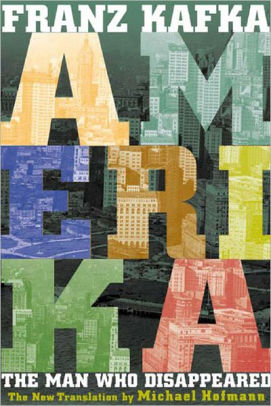 Amerika. New York. 2002. October 2002. New Directions. New Translation. 081121513x. Translated from the German by Michael Hofman. 218 pages. hardcover. Cover: Corbis/Semadar Megged.
Amerika. New York. 2002. October 2002. New Directions. New Translation. 081121513x. Translated from the German by Michael Hofman. 218 pages. hardcover. Cover: Corbis/Semadar Megged.
FROM THE PUBLISHER - The reason Franz Kafka’s Amerika (The Man Who Disappeared) is less known than his two other great novels may be that it never had Michael Hofmann as a translator. His magnificent new translation restores its rightful place as one of Kafka’s most delightful and most memorable works.’ -Charles Simic. ‘A major act of historical restoration: Max Brod’s renovations have been torn down, Edwin Muir’s 1928 English furniture has been removed and the result is that Amerika, the plot of the novel, can finally be seen as The Man Who Disappeared, a thrilling piece of writing.’ - Eliot Weinberger. Franz Kafka’s Amerika (The Man Who Disappeared) at last has the translator it deserves. Michael Hofmann’s startlingly visceral and immediate translation revives Kafka’s great comedy, and captures a new Kafka, free from Prague and loose in the new world, a Kafka shot through with light. The new English version of Amerika is at once highly charged and luminous and enormously nuanced. Kafka began his first novel in 1911, but like the others, Amerika remained unfinished, and perhaps, as Klaus Mann suggested, ‘necessarily endless.’ Karl Rossman, the youthful hero of the novel, ‘a poor boy of seventeen,’ has been banished by his parents to America, following a scandal. There, he throws himself into adventure after misadventure, and experiences multiply as he makes his way into the heart of the country, to The Great Nature Theater of Oklahoma. In creating this new translation, Hofmann, as he explains in his introduction, returned to the manuscript version of the book, restoring matters of substance and detail. Fragments which have never before been presented in English are now reinstated-including the book’s original ending. ‘A century after his birth Kafka seems the last holy writer, and the supreme fabulist of modern man’s cosmic predicament.’ - John Updike, The New Yorker. ‘I believe that Kafka never wrote a more accurate picture of Central Europe than in his novel Amerika.’ - Eleanor Clark, The Griffin. ‘This fantasy of a New World, so full of a childlike genius. . . .this strange book - Amerika. But more lovers of the extraordinary will be found for it in time.’ - Thomas Mann.
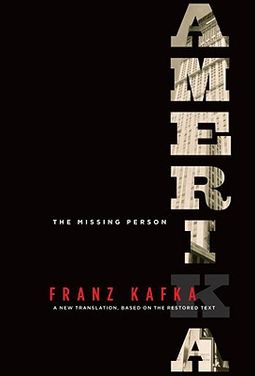 Amerika: The Missing Person. New York. 2008. Schocken Books. 9780805242119. Newly Translated from the German & With A Preface by Mark Harman. 300 pages. hardcover. Jacket photograph of the Empire State Building under construction by the Wurts Brothers/Milstein Division of United States History, Local History & Genealogy, The New York Public Library, Astor, Lenox and Tilden Foundations. Jacket design by Jonathan Sainsbury.
Amerika: The Missing Person. New York. 2008. Schocken Books. 9780805242119. Newly Translated from the German & With A Preface by Mark Harman. 300 pages. hardcover. Jacket photograph of the Empire State Building under construction by the Wurts Brothers/Milstein Division of United States History, Local History & Genealogy, The New York Public Library, Astor, Lenox and Tilden Foundations. Jacket design by Jonathan Sainsbury.
FROM THE PUBLISHER - FRANZ KAFKA'S diaries and letters suggest that his fascination with America grew out of a desire to break away from his native Prague, even if only in his imagination. Kafka died before he could finish what he liked to call his ‘American novel,’ but he clearly entitled it Der Verschollene (‘The Missing Person’) in a letter to his fiancee, Felice Bauer, in 1912. Kafka began writing the novel that fall and wrote the last completed chapter in 1914, but it wasn't until 1927, three years after his death, that AMERIKA - the title that Kafka's friend and literary executor Max Brod gave his edited version of the unfinished manuscript - was published in Germany by Kurt Wolff Verlag. An English translation by Willa and Edwin Muir was published in Great Britain in 1932 and in the United States in 1946. Over the last thirty years, an international team of Kafka scholars has been working on German-language critical editions of all of Kafka's writings, going back to the original manuscripts and notes, correcting transcription errors, and removing Brod's editorial and stylistic interventions to create texts that are as close as possible to the way the author left them. With the same expert balance of precision and nuance that marked his award-winning translation of THE CASTLE, Mark Harman now restores the humor and particularity of language in his translation of the critical edition of Der Verschollene. Here is the story of young Karl Rossmann, who, following an incident involving a housemaid, is banished by his parents to America. With unquenchable optimism and in the company of two comic-sinister companions, he throws himself into misadventure after misadventure, eventually heading toward Oklahoma, where a career in the theater beckons. Though we can never know how Kafka planned to end the novel, Harman's superb translation allows us to appreciate, as closely as possible, what Kafka did commit to the page.
The Castle
The world of Kafka, as already revealed in THE TRIAL, is one in which the individual struggles against ubiquitous, elusive, and anonymous powers determining and yet simultaneously opposing his every step. Kafka defines each situation very clearly, but at the same time an atmosphere of fearful uncertainty grows out of the weirdly illogical sequence of simple events. The tale of the arrival of a stranger in the village below the Castle, which seemingly rules it, reflects the pathos of human isolation and of man’s quest for freedom and responsibility, and the religious spirit which pervades all Kafka’s work. Upon his death in 1924, Kafka instructed his literary executor, Max Brod, to destroy all his manuscripts. Wisely refusing his friend’s last wishes, Brod edited the uncompleted CASTLE, along with other unfinished works, ordering the fragments into a coherent whole, and had them published. Brod’s interpretation of the work as a novel of personal salvation was accepted and strengthened by Willa and Edward Muir, who provided the standard English translation in 1930. Recent scholarship, less willing to accept Brod’s version, has led to a new critical edition of the novel, which was published in German in 1982 and which purports to be closer to Kafka’s intentions.
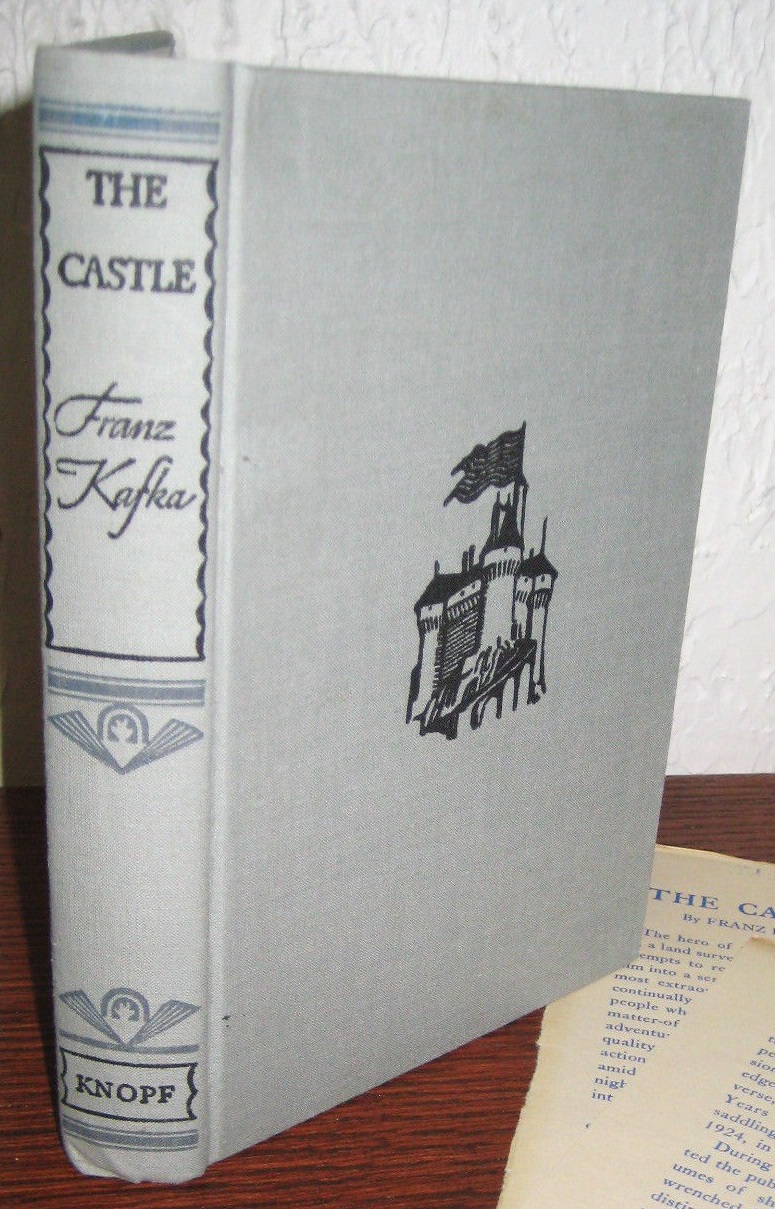 The Castle. New York. 1930. Knopf. 1st American Edition. Translated from the German by Edwin and Willa Muir. 340 pages. hardcover.
The Castle. New York. 1930. Knopf. 1st American Edition. Translated from the German by Edwin and Willa Muir. 340 pages. hardcover.
And there's more...
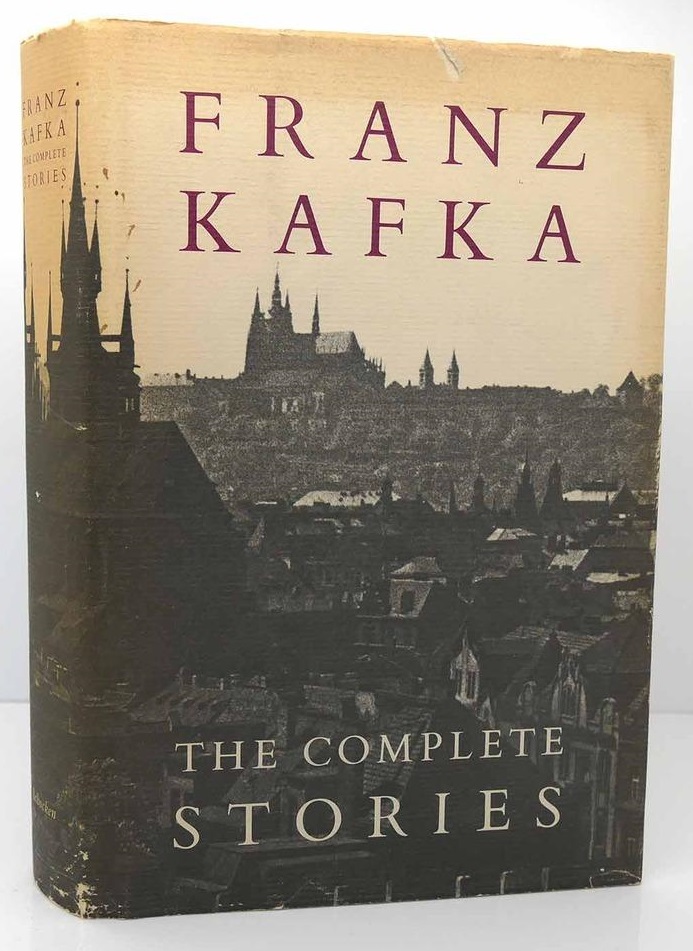 The Complete Stories. New York. 1983. Schocken Books. 0805238638. Introduction by John Updike. Edited by Nahum N. Glatzer. 486 pages. hardcover. Jacket photograph: ‘View of Old Prague from the Gunpowder Tower’ by Jan Parik. Jacket design by Margaret M. Wagner.
The Complete Stories. New York. 1983. Schocken Books. 0805238638. Introduction by John Updike. Edited by Nahum N. Glatzer. 486 pages. hardcover. Jacket photograph: ‘View of Old Prague from the Gunpowder Tower’ by Jan Parik. Jacket design by Margaret M. Wagner.
FROM THE PUBLISHER - The Centennial Edition in honor of Kafka's birthday collecting the entire body of Kafka's short stories and parables and reflecting his concern for modern man's search for identity, place, and purpose.
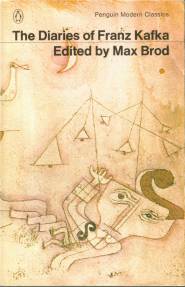 The Diaries Of Franz Kafka. Middlesex. 1972. Penguin Books. Penguin Modern Classics Edition. 014003403x. Translated from the German by Joseph Kresh and Martin Greenberg with the cooperation of Hannah Arendt. Edited by Max Brod. 519 pages. paperback. The cover, designed by Germano Facetti, shows a detail from 'Lied des Spottvogels' by Paul Klee.
The Diaries Of Franz Kafka. Middlesex. 1972. Penguin Books. Penguin Modern Classics Edition. 014003403x. Translated from the German by Joseph Kresh and Martin Greenberg with the cooperation of Hannah Arendt. Edited by Max Brod. 519 pages. paperback. The cover, designed by Germano Facetti, shows a detail from 'Lied des Spottvogels' by Paul Klee.
FROM THE PUBLISHER - Franz Kafka is the great enigma of early twentieth-century literature. Advocates of Impressionism, Existentialism, and even Christianity vie with each other in claiming him as an exemplar of their doctrines. He is seen as the successor of Dostoyevsky, the disciple of Kierkegaard and the forerunner of Sartre. Yet beside the profound searching of his great ‘trilogy of loneliness’ - the words are those of Max Brod, his lifelong friend and editor of the Diaries - such controversy seems insignificant. Kafka’s diaries cover the period from 1910 to 1923, the year before his death at the age of forty. They reveal to us the extraordinary inner world in which he lived. Here he describes, perhaps to relieve the pain which they caused him, his fear, isolation, and frustration, his feelings of guilt and his sense of being an outcast. In between come quick glimpses of the real world, of the father he worshipped, and of the woman he could not bring himself to marry. And throughout this personal journal Kafka the writer is experimenting, searching for his true mode of expression.
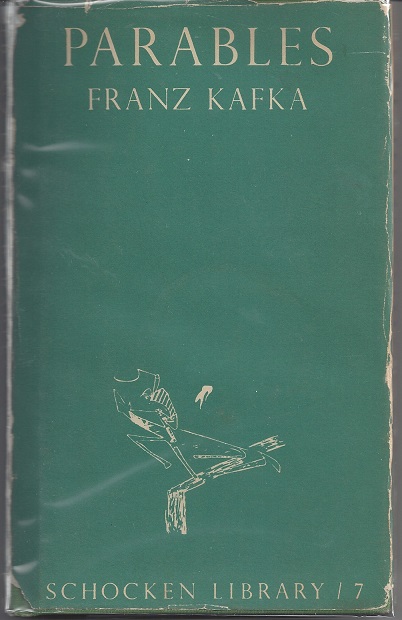 Parables. New York. 1947. Schocken Books. Translated from the German by Willa and Edwin Muir, and Clement Greenberg. Bilingual. Schocken Library #7. 127 pages. hardcover.
Parables. New York. 1947. Schocken Books. Translated from the German by Willa and Edwin Muir, and Clement Greenberg. Bilingual. Schocken Library #7. 127 pages. hardcover.
FROM THE PUBLISHER - This collection of Franz Kafka's mythological tales is drawn from his short pieces, his notebooks, diaries, letters, and the novel, The Trial. Some of the material appears here for the first time in English. As an innovation in Kafka editing, the original German is printed opposite the English translation. This device, usually employed only for verse translation, is adopted here in the belief that these short pieces may be read as poems, and that for such a reading the original text is required. The parables are divided into three main groups: 'Israel,’ ‘Hellas’ and ‘Occident.’ Central myths of these cultural traditions are boldly re-examined and rewritten by Kafka in terms of his richly humorous and uniquely modern sensibility. After having read Kierkegaard on Abraham, Kafka speculates on other possible versions of the Father of the Jews. He transforms Poseidon, Greek god of the sea, into a cranky bureaucrat always too busy with his bookkeeping to examine his oceans. In the final section, ‘Occident,’ Kafka develops his parables about such figures as the hunter Gracchus, Sancho Panza and Robinson Crusoe. "Had one to name the author who comes nearest to bearing the same kind of relation to our age as Dante, Shakespeare and Goethe bore to theirs, Kafka is the first one would think of." - W. H. Auden.
Biographies...
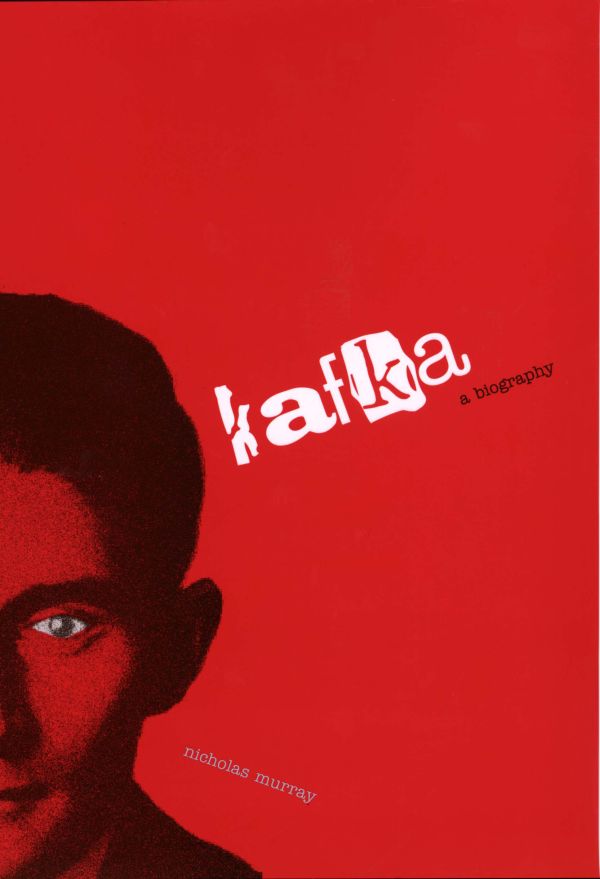 Murray, Nicholas. Kafka: A Biography. New Haven. 2004. Yale University Press. 1st American Edition. Very Good in Dustjacket. ISBN:0300106319. 440 pages. hardcover. Jacket photograph: Franz Kafka, ca. 1910s.
Murray, Nicholas. Kafka: A Biography. New Haven. 2004. Yale University Press. 1st American Edition. Very Good in Dustjacket. ISBN:0300106319. 440 pages. hardcover. Jacket photograph: Franz Kafka, ca. 1910s.
FROM THE PUBLISHER - Although Franz Kafka (1883-1924) completed only a small number of works in his lifetime, perhaps no other author has had a greater influence on twentieth-century consciousness. This engrossing biography of the Czech novelist and short-story writer emphasizes the cultural and historical contexts of his fiction and focuses for the first time on his complex relationship with his father. Nicholas Murray paints a picture of Kafka’s German-speaking Jewish family and the Prague mercantile bourgeoisie to which they belonged. He describes Kafka’s demanding professional career, his ill health, and the constantly receding prospects of a marriage he craved. He analyzes Kafka’s poor relationship with his father, Hermann, which found its most eloquent expression in Kafka’s story ‘The Judgement,’ about a father who condemns his son to death by drowning. And he asserts that the unsettling flavor of Kafka’s books-stories suffused with guilt and frustration-derives from his sense of living in a mysteriously antagonistic world, of being a criminal without having knowingly committed a crime. Compelling and empathetic, this book sheds new light on a man of unique genius and on his enigmatic works.
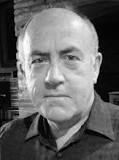 Nicholas Murray is a British biographer, poet and journalist. Murray is a freelance author based in Wales and London. Born in Liverpool he is the author of several literary biographies including lives of Franz Kafka, Aldous Huxley, Bruce Chatwin, Andrew Marvell and Matthew Arnold, four collections of poems, and two novels. His biography of Matthew Arnold was a New York Times Notable Book of the Year in 1997 and his biography of Aldous Huxley was shortlisted for the Marsh Biography Award in 2003. His biography of Franz Kafka has been translated into nine languages. He is a regular contributor of poems, essays and reviews to a wide range of newspapers and literary magazines In 1996 he was the inaugural Gladys Krieble Delmas Fellow at the British Library Centre for the Book and he is a Fellow of the Welsh Academy and vice-chair of English PEN’s Writers in Translation Committee. He has lectured at literary festivals and universities in Britain, Europe and the United States. From 2003-2007 he was Royal Literary Fund Fellow at Queen Mary University, London and from 2010-2011 an RLF Fellow at King's College, London. He is a tutor in biography and creative non-fiction at the City Literary Institute in London. So Spirited a Town: Visions and Versions of Liverpool was published by Liverpool University Press in November 2007 and a book about the British Victorian travellers and explorers, A Corkscrew is Most Useful, was published by Little, Brown in April 2008. In November 2010 his book about Bloomsbury in the “Real” series was published: Real Bloomsbury (Seren, ISBN 9781854115263). His book about the British poets of the First World War, The Red Sweet Wine of Youth (Little, Brown) appeared in February 2011 and his verse broadside against the British coalition government, Get Real! also appeared in February 2011. In April 2012 Acapulco: New and Selected Poems appeared from Melos Press. His latest book is Of Earth, Water, Air and Fire: animal poems (Melos, 2013). Murray also runs a small poetry imprint, Rack Press, and writes the Bibliophilicblogger literary blog. In August 2015, Murray was one of 20 authors of Poets for Corbyn, an anthology of poems endorsing Jeremy Corbyn's campaign in the Labour Party leadership election.
Nicholas Murray is a British biographer, poet and journalist. Murray is a freelance author based in Wales and London. Born in Liverpool he is the author of several literary biographies including lives of Franz Kafka, Aldous Huxley, Bruce Chatwin, Andrew Marvell and Matthew Arnold, four collections of poems, and two novels. His biography of Matthew Arnold was a New York Times Notable Book of the Year in 1997 and his biography of Aldous Huxley was shortlisted for the Marsh Biography Award in 2003. His biography of Franz Kafka has been translated into nine languages. He is a regular contributor of poems, essays and reviews to a wide range of newspapers and literary magazines In 1996 he was the inaugural Gladys Krieble Delmas Fellow at the British Library Centre for the Book and he is a Fellow of the Welsh Academy and vice-chair of English PEN’s Writers in Translation Committee. He has lectured at literary festivals and universities in Britain, Europe and the United States. From 2003-2007 he was Royal Literary Fund Fellow at Queen Mary University, London and from 2010-2011 an RLF Fellow at King's College, London. He is a tutor in biography and creative non-fiction at the City Literary Institute in London. So Spirited a Town: Visions and Versions of Liverpool was published by Liverpool University Press in November 2007 and a book about the British Victorian travellers and explorers, A Corkscrew is Most Useful, was published by Little, Brown in April 2008. In November 2010 his book about Bloomsbury in the “Real” series was published: Real Bloomsbury (Seren, ISBN 9781854115263). His book about the British poets of the First World War, The Red Sweet Wine of Youth (Little, Brown) appeared in February 2011 and his verse broadside against the British coalition government, Get Real! also appeared in February 2011. In April 2012 Acapulco: New and Selected Poems appeared from Melos Press. His latest book is Of Earth, Water, Air and Fire: animal poems (Melos, 2013). Murray also runs a small poetry imprint, Rack Press, and writes the Bibliophilicblogger literary blog. In August 2015, Murray was one of 20 authors of Poets for Corbyn, an anthology of poems endorsing Jeremy Corbyn's campaign in the Labour Party leadership election.
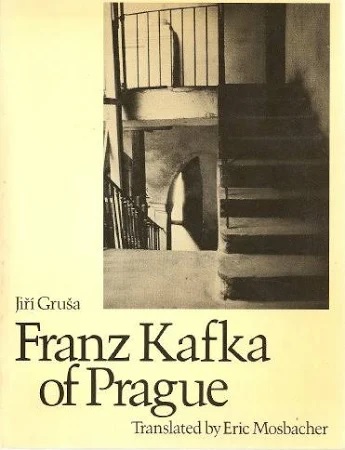 Grusa, Jiri. Franz Kafka of Prague. London. 1983. Secker & Warburg. 0436230518. Translated from the German by Eric Mosbacher. 127 pages. paperback.
Grusa, Jiri. Franz Kafka of Prague. London. 1983. Secker & Warburg. 0436230518. Translated from the German by Eric Mosbacher. 127 pages. paperback.
FROM THE PUBLISHER - Gathers photographs of Kafka, his family, and Prague, both in his time and the present day, and includes quotations from his work.
 Jirí Gruša (10 November 1938, in Pardubice – 28 October 2011, in Hannover) was a Czech poet, novelist, translator, diplomat and politician. Gruša was born in Pardubice, Bohemia (Czech Republic), and later moved to Prague. He graduated from the Philosophical Faculty of Charles University in Prague. He worked for periodicals Tvár, Sešity and Nové knihy. He started coming under the scrutiny of the communist regime of then Czechoslovakia in 1969 because of his writings. He was banned from publishing and had to work in a construction cooperative. He took part in distribution of samizdat literature. He was arrested in 1974 for ‘the crime of initiating disorder’ after distributing nineteen copies of his first novel, Dotazník (The Questionnaire) and voicing his intention to have it published in Switzerland. After world-wide protest, he was released after two months. He later became a signer of the human rights document, Charter 77. In 1981 his citizenship was revoked, and between 1982 and 1990 he lived in the Federal Republic of Germany. In 1990 conditions in Czechoslovakia became more favorable and he returned to work for the Ministry of Foreign Affairs. From 1991–1997, he served as an ambassador to Germany. Later, he joined the minority government of Václav Klaus as a Minister of Education. The government lost support of the opposition parties and President Václav Havel orchestrated establishment of a new caretaker government. Even though Gruša was a non-party minister, he was replaced by Jan Sokol. He served as an ambassador to Austria until 2004. From 2005 to 2009 he was Director of the Diplomatic Academy of Vienna. From 2004 to 2009 he was the President of PEN International. Gruša participated in standardisation of the term ‘Tschechien’ as the official name of the Czech Republic in German language. See Name of the Czech Republic for overview. Gruša died at the age of 72 on 28 October 2011 during a heart operation in Germany. Václav Havel wrote (before his own death a month and a half later on December 18) that Gruša was ‘one of a few close people whom I deeply respected and who have left this world recently.’
Jirí Gruša (10 November 1938, in Pardubice – 28 October 2011, in Hannover) was a Czech poet, novelist, translator, diplomat and politician. Gruša was born in Pardubice, Bohemia (Czech Republic), and later moved to Prague. He graduated from the Philosophical Faculty of Charles University in Prague. He worked for periodicals Tvár, Sešity and Nové knihy. He started coming under the scrutiny of the communist regime of then Czechoslovakia in 1969 because of his writings. He was banned from publishing and had to work in a construction cooperative. He took part in distribution of samizdat literature. He was arrested in 1974 for ‘the crime of initiating disorder’ after distributing nineteen copies of his first novel, Dotazník (The Questionnaire) and voicing his intention to have it published in Switzerland. After world-wide protest, he was released after two months. He later became a signer of the human rights document, Charter 77. In 1981 his citizenship was revoked, and between 1982 and 1990 he lived in the Federal Republic of Germany. In 1990 conditions in Czechoslovakia became more favorable and he returned to work for the Ministry of Foreign Affairs. From 1991–1997, he served as an ambassador to Germany. Later, he joined the minority government of Václav Klaus as a Minister of Education. The government lost support of the opposition parties and President Václav Havel orchestrated establishment of a new caretaker government. Even though Gruša was a non-party minister, he was replaced by Jan Sokol. He served as an ambassador to Austria until 2004. From 2005 to 2009 he was Director of the Diplomatic Academy of Vienna. From 2004 to 2009 he was the President of PEN International. Gruša participated in standardisation of the term ‘Tschechien’ as the official name of the Czech Republic in German language. See Name of the Czech Republic for overview. Gruša died at the age of 72 on 28 October 2011 during a heart operation in Germany. Václav Havel wrote (before his own death a month and a half later on December 18) that Gruša was ‘one of a few close people whom I deeply respected and who have left this world recently.’
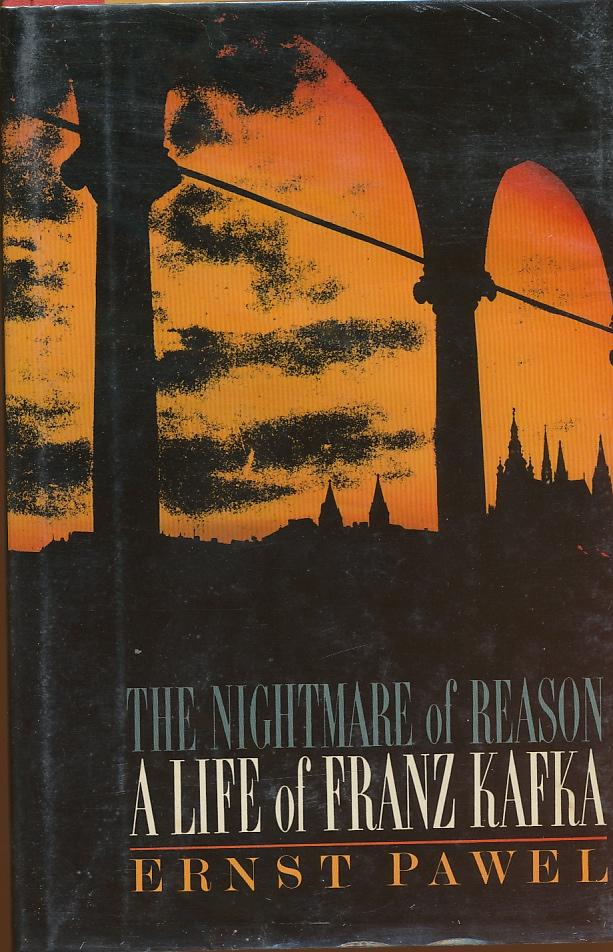 Pawel, Ernst. The Nightmare Of Reason: A Life Of Franz Kafka. New York. 1984. Farrar Straus Giroux. 0374222363. 496 pages. hardcover.
Pawel, Ernst. The Nightmare Of Reason: A Life Of Franz Kafka. New York. 1984. Farrar Straus Giroux. 0374222363. 496 pages. hardcover.
FROM THE PUBLISHER - A comprehensive and interpretative biography of Franz Kafka that is both a monumental work of scholarship and a vivid, lively evocation of Kafka's world.. inventory #6043
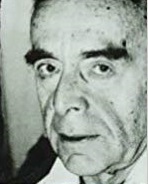 Ernst Pawel (Born: 1920, Wrocław, Poland - August 1994, Great Neck, NY) is the author of three novels and the award-winning The Nightmare of Reason: A Life of Franz Kafka.
Ernst Pawel (Born: 1920, Wrocław, Poland - August 1994, Great Neck, NY) is the author of three novels and the award-winning The Nightmare of Reason: A Life of Franz Kafka.
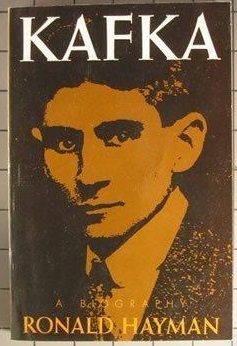 Hayman, Ronald. Kafka: A Biography. New York. 1982. Oxford University Press. 0195202791. 349 pages. hardcover.
Hayman, Ronald. Kafka: A Biography. New York. 1982. Oxford University Press. 0195202791. 349 pages. hardcover.
FROM THE PUBLISHER - The first full-scale biography of Kafka since Max Brod's memoir of 1937. Hayward portrays the milieu in which Kafka was raised, as part of the first generation of Jews fully liberated from the ghetto but still surrounded by violence and mistrust.
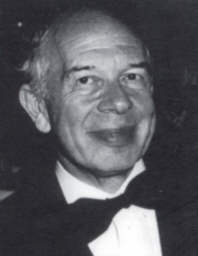 Ronald Hayman (born 4 May 1932) is a British critic, dramatist, and writer best known for his biographies. He has worked in the theatre as an actor and director. His books include biographies of Nietzsche, Kafka, Brecht, Sartre and Proust. He writes for the Independent and the Guardian, broadcasts regularly and writes the Radio 3 comedy series Such Rotten Luck. He lives in London.
Ronald Hayman (born 4 May 1932) is a British critic, dramatist, and writer best known for his biographies. He has worked in the theatre as an actor and director. His books include biographies of Nietzsche, Kafka, Brecht, Sartre and Proust. He writes for the Independent and the Guardian, broadcasts regularly and writes the Radio 3 comedy series Such Rotten Luck. He lives in London.
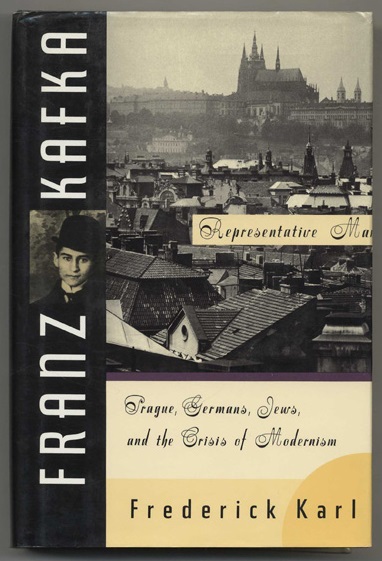 Karl, Frederick. Franz Kafka-Representative Man: Prague, Germans, Jews, and The Crisis Of Modernism. New York. 1991. Ticknor & Fields. 0395561434. 768 pages. hardcover.
Karl, Frederick. Franz Kafka-Representative Man: Prague, Germans, Jews, and The Crisis Of Modernism. New York. 1991. Ticknor & Fields. 0395561434. 768 pages. hardcover.
FROM THE PUBLISHER - From the cauldron of fin-de-siècle Middle Europe emerged the writer who most startlingly embodies this century's artistic vision and whose name is virtually synonymous with the century—Franz Kafka. The definitive critical biography of one of the world's greatest writers, Franz Kafka: Representative Man examines Kafka as the quintessential expression of modernism. Not just a personal biography, Franz Kafka: Representative Man presents a vivid and authoritative picture of the historical, cultural, and artistic world from which Kafka arose, examining the entire body of his writing in light of his status as the representative man of our time. Freud, Nietzsche, Einstein, Picasso, Rilke, Mahler, and Stravinsky—all were a part of the radically subversive movement known as modernism, and all are included in Dr. Karl's monumental study. Yet of all these brilliant minds that transformed our notions of the human condition, it is Kafka who has come to embody our century. Informed by a lifetime of thought and research, and drawing on newly discovered letters—not yet translated into English—from Kafka to his parents, Frederick Karl, the acclaimed biographer of Conrad and Faulkner, leads us on an intellectual journey through the labyrinth of Prague, amid the growing ethnic tensions that would explode in the Second World War, in an empire struggling with its national identity and on the verge of collapse. Dr. Karl, with astonishing command and penetrating insight, interweaves the many strands of person, place, and time to illuminate Kafka the individual, the artist, and the representative man. This book is an invaluable contribution to literary studies and the history of modern culture.
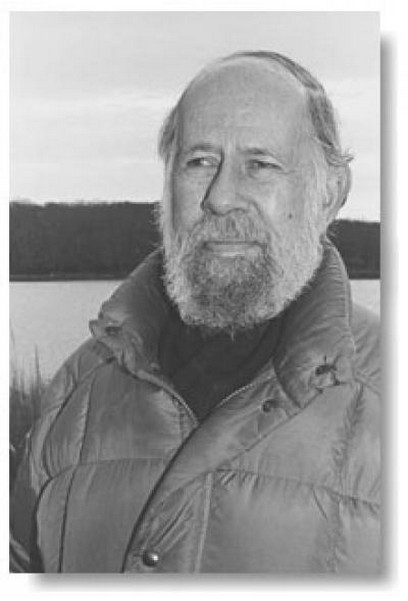
Kafka and Prague...
 Eisner, Pavel. Franz Kafka and Prague. New York. 1950. Golden Griffin. 100 pages. hardcover. Jacket design by Ladislav Sutnar.
Eisner, Pavel. Franz Kafka and Prague. New York. 1950. Golden Griffin. 100 pages. hardcover. Jacket design by Ladislav Sutnar.
FROM THE PUBLISHER - Here, at long last, is a book on Franz Kafka that rips away the veil of obscurity which has enshrouded Kafka's works and Kafka the man. Pavel Eisner has succeeded in rescuing Kafka from the realms of mysticism and mystery, where he has unfortunately been placed for too long a time by his critics and friends, and has made him understandable and coherent - Kafka has been called at various times a mystic, a romantic, an ecstatic, a moralist, a dreamer, a satirist. He himself has compared his work with "a new secret doctrine, a cabala."' Out of this welter of confusing labels and symbols, the reader has sought for a key to understand this strange man of genius, Pavel Eisner has supplied that key, giving us a "factually incontrovertible account of the situation and circumstances which determined Kafka's existence" - his life in the spiritual ghetto of Prague. He opens wide the gates of the old city of Prague, takes us into the insulated life of Prague's Jewry of former years, into the very home of Kafka himself. And here in the German-Jewish-Czech milieu where Kafka lived, dreamed, worked, and wrote, we are introduced to the special, peculiar, esoteric factors which shaped the lives and thoughts of "these strangers in exile, linked to death itself." - Jules Koslow.
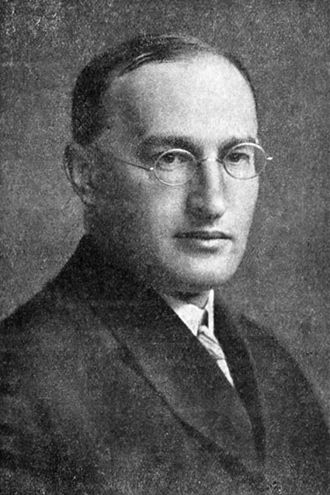 Pavel Eisner (16 January 1889 – 8 July 1958), also known as Paul Eisner and under the pseudonym Vincy Schwarze, was Czech-German linguist and translator and the author of many studies about Czech language. He is considered one of the most important Czech translators of all time and was said to be proficient in 12 languages - English, French, Icelandic, Italian, Hungarian, German, Norwegian, Persian, Russian, Serbian, Spanish, and Tibetan. He produced some of the earliest Czech language translations of Franz Kafka's work. Eisner came from a Jewish family in Prague. He was bilingual from his childhood. He went to college at Prague's German University, where he studied Slavonic, German, and Romance languages and graduated in 1918. He worked as a translator for the Czech Chamber of Commerce and Crafts and, at the same time, edited for the German newspaper, Prager Presse. During this time, he also contributed to several cultural magazines. During the German occupation, he and his wife were persecuted as members of the Jewish community, though he managed to publish a book under the pseudonym, Vincy Schwarze.
Pavel Eisner (16 January 1889 – 8 July 1958), also known as Paul Eisner and under the pseudonym Vincy Schwarze, was Czech-German linguist and translator and the author of many studies about Czech language. He is considered one of the most important Czech translators of all time and was said to be proficient in 12 languages - English, French, Icelandic, Italian, Hungarian, German, Norwegian, Persian, Russian, Serbian, Spanish, and Tibetan. He produced some of the earliest Czech language translations of Franz Kafka's work. Eisner came from a Jewish family in Prague. He was bilingual from his childhood. He went to college at Prague's German University, where he studied Slavonic, German, and Romance languages and graduated in 1918. He worked as a translator for the Czech Chamber of Commerce and Crafts and, at the same time, edited for the German newspaper, Prager Presse. During this time, he also contributed to several cultural magazines. During the German occupation, he and his wife were persecuted as members of the Jewish community, though he managed to publish a book under the pseudonym, Vincy Schwarze.
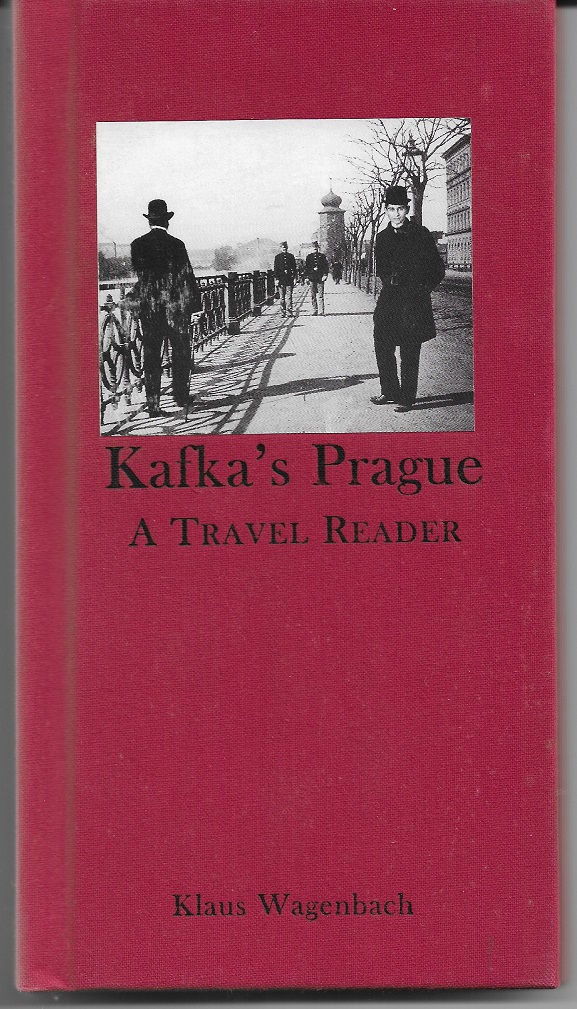 Wagenbach, Klaus. Kafka's Prague: A Travel Reader. Woodstock. 1996. Overlook Press. 0879516445. Translated From German by Shaun Whiteside. 123 pages. hardcover.
Wagenbach, Klaus. Kafka's Prague: A Travel Reader. Woodstock. 1996. Overlook Press. 0879516445. Translated From German by Shaun Whiteside. 123 pages. hardcover.
FROM THE PUBLISHER - Franz Kafka, whose cool prose, sparse in vocabulary and yet ‘Kleistian’ in tone, whose literary images-of the performing ape or the transformed Samsa, the country surveyor or the penal colony-and whose expert reports on power as it was to be exerted from the middle of our century has left such an enduring influence on almost all the world’s literatures, hardly ever left his home city of Prague during his short life (1883-1924): several business trips, a number of educational visits, many stays in sanatoria, six months in Berlin, and a few months in the Bohemian countryside-nothing more. ‘Prague;’ Kafka wrote as a nineteen-year-old, ‘doesn’t let go. This little mother has claws: ’ And in 1912, at the age of twenty-nine, with four years’ work as a clerk behind him, and on the point of writing his first novel: ‘How can I live in Prague! This yearning for people that I have, and which becomes fear when fulfilled, can only be assuaged in the holidays. . .’ Two years later in his diary: ‘Leave Prague. Counter this most powerful human injury that has ever befallen me with the strongest antidote at my disposal: ’ And in 1917, with resignation: ‘Prague: Religions fade away like people: ’ So if you wish to know what houses Kafka lived in (almost all of them are still standing) or what he means when he writes: ‘I prefer to go strolling in parks and avenues;’ in short, what Kafka ‘had before his eyes;’ you must go to Prague, in reality or in the imagination. This travel book-cum-reader is intended as an accompaniment for both kinds of journey, and I have taken special care to show the houses and streets as they appeared in Kafka’s lifetime.
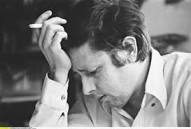 Klaus Wagenbach, a publisher and renowned Kafka expert, has written six books on the author, including Kafka: A Biography of His Youth and Kafka's Prague.
Klaus Wagenbach, a publisher and renowned Kafka expert, has written six books on the author, including Kafka: A Biography of His Youth and Kafka's Prague.
